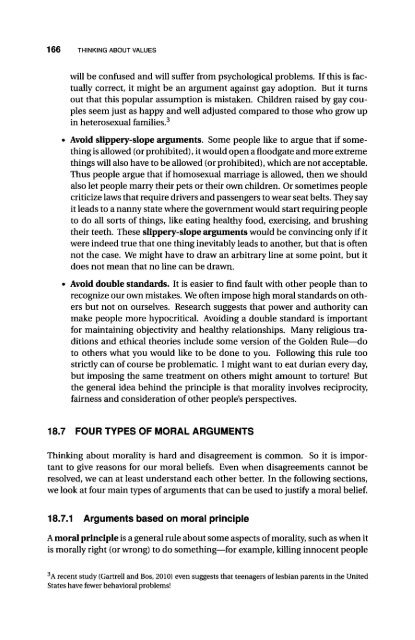An Introduction to Critical Thinking and Creativity - always yours
An Introduction to Critical Thinking and Creativity - always yours
An Introduction to Critical Thinking and Creativity - always yours
You also want an ePaper? Increase the reach of your titles
YUMPU automatically turns print PDFs into web optimized ePapers that Google loves.
166 THINKING ABOUT VALUES<br />
will be confused <strong>and</strong> will suffer from psychological problems. If this is factually<br />
correct, it might be an argument against gay adoption. But it turns<br />
out that this popular assumption is mistaken. Children raised by gay couples<br />
seem just as happy <strong>and</strong> well adjusted compared <strong>to</strong> those who grow up<br />
in heterosexual families. 3<br />
Avoid slippery-slope arguments. Some people like <strong>to</strong> argue that if something<br />
is allowed (or prohibited), it would open a floodgate <strong>and</strong> more extreme<br />
things will also have <strong>to</strong> be allowed (or prohibited), which are not acceptable.<br />
Thus people argue that if homosexual marriage is allowed, then we should<br />
also let people marry their pets or their own children. Or sometimes people<br />
criticize laws that require drivers <strong>and</strong> passengers <strong>to</strong> wear seat belts. They say<br />
it leads <strong>to</strong> a nanny state where the government would start requiring people<br />
<strong>to</strong> do all sorts of things, like eating healthy food, exercising, <strong>and</strong> brushing<br />
their teeth. These slippery-slope arguments would be convincing only if it<br />
were indeed true that one thing inevitably leads <strong>to</strong> another, but that is often<br />
not the case. We might have <strong>to</strong> draw an arbitrary line at some point, but it<br />
does not mean that no line can be drawn.<br />
Avoid double st<strong>and</strong>ards. It is easier <strong>to</strong> find fault with other people than <strong>to</strong><br />
recognize our own mistakes. We often impose high moral st<strong>and</strong>ards on others<br />
but not on ourselves. Research suggests that power <strong>and</strong> authority can<br />
make people more hypocritical. Avoiding a double st<strong>and</strong>ard is important<br />
for maintaining objectivity <strong>and</strong> healthy relationships. Many religious traditions<br />
<strong>and</strong> ethical theories include some version of the Golden Rule—do<br />
<strong>to</strong> others what you would like <strong>to</strong> be done <strong>to</strong> you. Following this rule <strong>to</strong>o<br />
strictly can of course be problematic. I might want <strong>to</strong> eat durian every day,<br />
but imposing the same treatment on others might amount <strong>to</strong> <strong>to</strong>rture! But<br />
the general idea behind the principle is that morality involves reciprocity,<br />
fairness <strong>and</strong> consideration of other people's perspectives.<br />
18.7 FOUR TYPES OF MORAL ARGUMENTS<br />
<strong>Thinking</strong> about morality is hard <strong>and</strong> disagreement is common. So it is important<br />
<strong>to</strong> give reasons for our moral beliefs. Even when disagreements cannot be<br />
resolved, we can at least underst<strong>and</strong> each other better. In the following sections,<br />
we look at four main types of arguments that can be used <strong>to</strong> justify a moral belief.<br />
18.7.1 Arguments based on moral principle<br />
A moral principle is a general rule about some aspects of morality, such as when it<br />
is morally right (or wrong) <strong>to</strong> do something—for example, killing innocent people<br />
3 A recent study (Gartrell <strong>and</strong> Bos, 2010) even suggests that teenagers of lesbian parents in the United<br />
States have fewer behavioral problems!
















